 (This blog is a continuation of the comments from the previous post - Driving Guinness.)
(This blog is a continuation of the comments from the previous post - Driving Guinness.)The founders of Cavalia have written a book that apparently delves deeply into this discussion. Click on the photo of the cover of the book to be taken to Amazon where you can search inside the book. Click on Interview to listen to an interview with the authors from NPR. Click on Excerpt to read more about them. Click on Article to read more about their "Six Golden Principles" of playing with horses.
*********************
Force versus psychological manipulation as tools for communication.. Fear versus respect - is it almost the same thing, except that the response of someone respected can be controlled by one's own behavior?
What happens when my horse that isn't afraid of me, but also doesn't have any intent to do me harm? What if he only balks when he is questioning my judgment or is conserving his energy - often a prudent tactic in a natural environment? (My other partner - my husband - also exhibits very similar behavior!)
The funny thing is that I'm in the very same quandary about my pre-teen son. I'd almost come to the conclusion that I'd raised him incorrectly. That if I'd only corrected him physically (phase 4) at an early age, he would be more compliant & obedient now.. It is too late now because he is getting bigger than I am (not to mention the legal issues)! Perhaps an underlying element of fear is a good thing? After all, the world is a dangerous place..?
If a horse (or kid) isn't afraid then why would they choose to do what you/I want them to do? Could the answer be "because I have good ideas/answers"? But how would they learn that my answers are good without experiencing the consequences of their own poor decisions?
There may truly be a time in a child's life when force is necessary to keep them safe. When they are too young to face the consequences of their own decisions. But as they mature, we as parents are supposed to move into more of a supportive guidance counselor-type role.
So what about our horses? According to Temple Grandin, we infantalize our pets through selective breeding and by preventing them from acting as mature, adult, fully-functional animals. Do we do this to our horses in order to keep them dependent upon us? Maybe so. Isn't that what "domestication" is?
I've heard the opinion that if a horse doesn't "respect" you, then he is a danger to be around. In this case, "respect" really means "fear you enough to move when you tell him too." I may have that with Guinness. If I put a point on my intention and really bring up my energy, he will move. However, he is a very "short" horse meaning that his flight distance is small before he turns and faces and wants to investigate. He is also foolishly brave. He is not being disrespectful, it is the way that his brain is wired.
In PNH, and perhaps more so in clicker training, we encourage horses to think. However, it seems that once they begin thinking for themselves, and realizing that they have choices, we sometimes want to put the genie back into the box! We want them to think what we want them to think. We want them to be obedient. Isn't that also how we feel about teenagers in general?
There is something to the idea of meeting the horse as an equal adult creature with thoughts, feelings, opinions, and as much soul as we humans have. We humans tend to think that we are superior because we are masters of linear thinking. We devalue right-brain thinking (see the book Drawing on the Right Side of the Brain). Our horses see the world in a different way than we do and this gives them a different perspective. Not inferior to ours. We have much to learn from them.
So, I don't know where this line of thinking goes. It has been rattling around inside of my head for awhile and I needed to write it down. Plus, I needed a place to link these amazing resources. ;-) Please feel free to post your thoughts!
Thanks for the inspiration, Tenley.



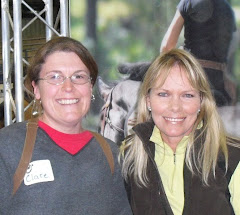




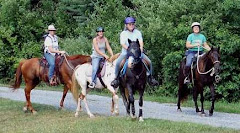

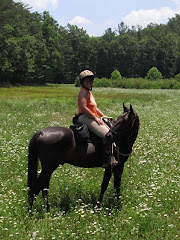
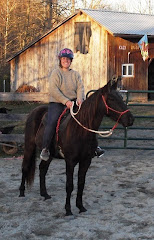
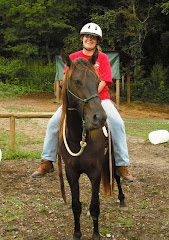
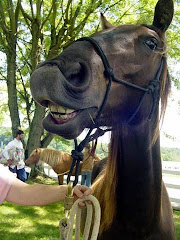

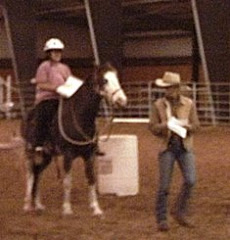

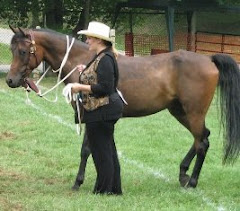
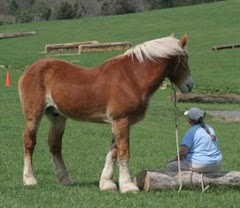


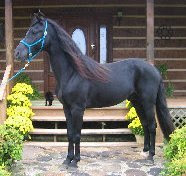
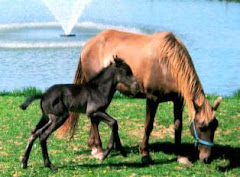
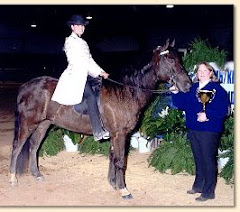
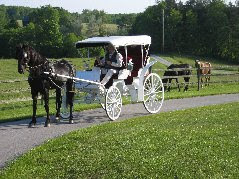
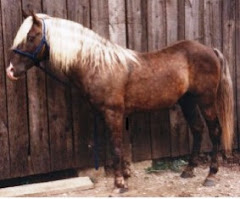




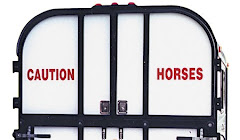
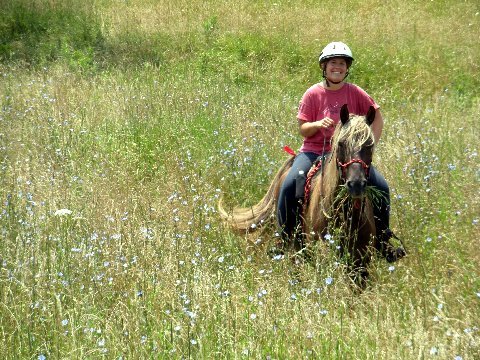
7 comments:
Very interesting thought process. A couple of things . . .
"meeting the horse as an equal" - to me, this only goes so far. Horses are not equipped to live in the world we have created. While I can appreciate my horse as an individual, with thoughts and emotions and "values" of her own, it is my responsibility as her steward to keep her safe. On the plains, running free, she's perfectly able to care for herself. But that is not where she lives. My relationship with her is as much for her protection as it is for my enjoyment.
Another thought - horses, ALL horses, are natural followers. That being said, obviously wild herds have leaders. So some horses are capable of being leaders as well. So what does it take to be a leader to a lead horse and evoke the desire to follow? Answer me that and I have the key to my entire relationship with Cricket!
Fear is a tricky thing. Leadership based on any fear is a bit of a house of cards. The minute the follower looses fear, the leader looses control. Because that's what it is - just control. Great leaders cause, in their follower, desire for connection and togetherness. The followers follow not out of fear but desire.
We open Pandora's box when we give our horses the "right" to display emotion and choice. What we have to do is CAUSE their choice to be our choice. How we do that defines the kind of leader we are. I find myself frustrated with my PNH journey with Cricket. She's not motivated to do anything I want and I get frustrated and mad at her lack of desire. I can make her do as I say but it's not pretty because it's not freely offered.
On the other hand, I can make Bleu do something and she's very obedient but she's very afraid. And that's no fun either because she's only following out of fear and her fear of me is greater than her fear of whatever I'm asking her to do. That's a crappy relationship.
I'll be interested to see what other thoughts this provokes.
Very interesting, and thought provoking post!
I think that its possible for a horse (or human) to be unafraid of you, yet disrespect you. Just because someone isn't afraid of you, doesn't mean that they trust your judgment and leadership, either. As Pat Parelli says, a good horseman does things FOR the horse, rather than TO the horse. If our leadership goal is to control, then we've lost the game plan. If our role as a leader is to inspire, encourage, and challenge, and give the horse or human what they NEED.. then we've done our job!
Another thing I thought about, is the more someone respects you, the more subtle your phases become. The other thing is that if your phase 4 is ONLY about control, it can end up being purely physical. But to me, if we're carrying out a phase 4 FOR the horse, its easier to use psychology.
Lastly, the minute force, fear and intimidation are involved, we're not truly allowing the horse to have opinions. Good leadership produces self-confident individuals. Its a partnership, which means that the horse has responsibilities to uphold, too!
As you can see.. this post got my mind ticking! Thanks for sharing your thoughts!
Kerrin Koetsier
Parelli Central
Well, in my short study of Parelli I have found a distinct difference between fear and motivation. I certainly haven't found the line or where I fall on it yet, still learning, but would you say that in most cases the lower horses fear the leader of a herd?
Are we giving the horse too much human emotion here?
I don't know, I'm in your guys' boat as well. My relationships are getting better but I notice that Pat seems to do a lot of forcing at level 1 for the horses he uses in demos. Is the only important thing to keep in mind where you want to go and work to getting there? Change fear into something more? Justice does seem to be key, no reason to fear someone who is just?
I have several friends along with myself who are currently struggling with what it means to be a leader--whether and how to "take" a leadership role, and what it should look like.
I am not talking about just "taking" the leadership role, or filling the vaccuum created when others do not step up; but our need to EMBRACE the leadership role. And that for one reason, or another reason, or many reasons we are not yet able to. We might make a mistake, somebody might not like us, we might not be good at it, we really want to be a follower (safer) instead, we might get criticized--all out there with our leadership stuff on display. And perhaps importantly, we are aware that we do harm when we are not adequate to the task.
But I think the consequences of not being a good leader for our horses (and in our lives) are worse:
1. The horse will feel the need to fill the vacuum we have created, and this is dis-harmonious, because it is not safe to let the horse take over, so we will not really let leadership go, we will just become half-assed ineffective leaders.
2. Loss of respect from others.
3. Loss of self respect on a deep level.
4.Ineffectiveness at our tasks, whether with our horses, at our jobs, with our families.
To my mind, the mere act of EMBRACING leadership puts us into a position to overcome obstacles. So how do we get competence as leaders? Study with those ahead of us on the journey, identify deficiencies and plan to overcome them, learn from our mistakes, and perhaps resolve to be kind to the emerging leader within. :-)
Horse-wise, I highly recommend watching Linda Parelli's Liberty and Horse Behavior "problem solving" dvds for some effective strategies for different horseanality types.
How interesting! Thanks for all of your insightful comments. I'm going to start another blog post.. :-)
Great conversation, guys! I hope this will carry through into the next post...
In response to what you said, Peter C, I think the rate at which we establish ourselves as leaders depends on our level of horsemanship. Pat Parelli has played with hundreds of thousands of horses, so most of the time, he automatically knows what to expect of the horse. If we require our horses to live up to our expectations (act as a partner, not a prey animal), one of the ways to work through that, is to expose the unwanted behaviour.
To me, leadership is absolutely not fear-based. Control and dominance may result in fear, but a true leader has a balance of love, language and leadership.
Does that make sense?
Kerrin
Parelli Central
Post a Comment